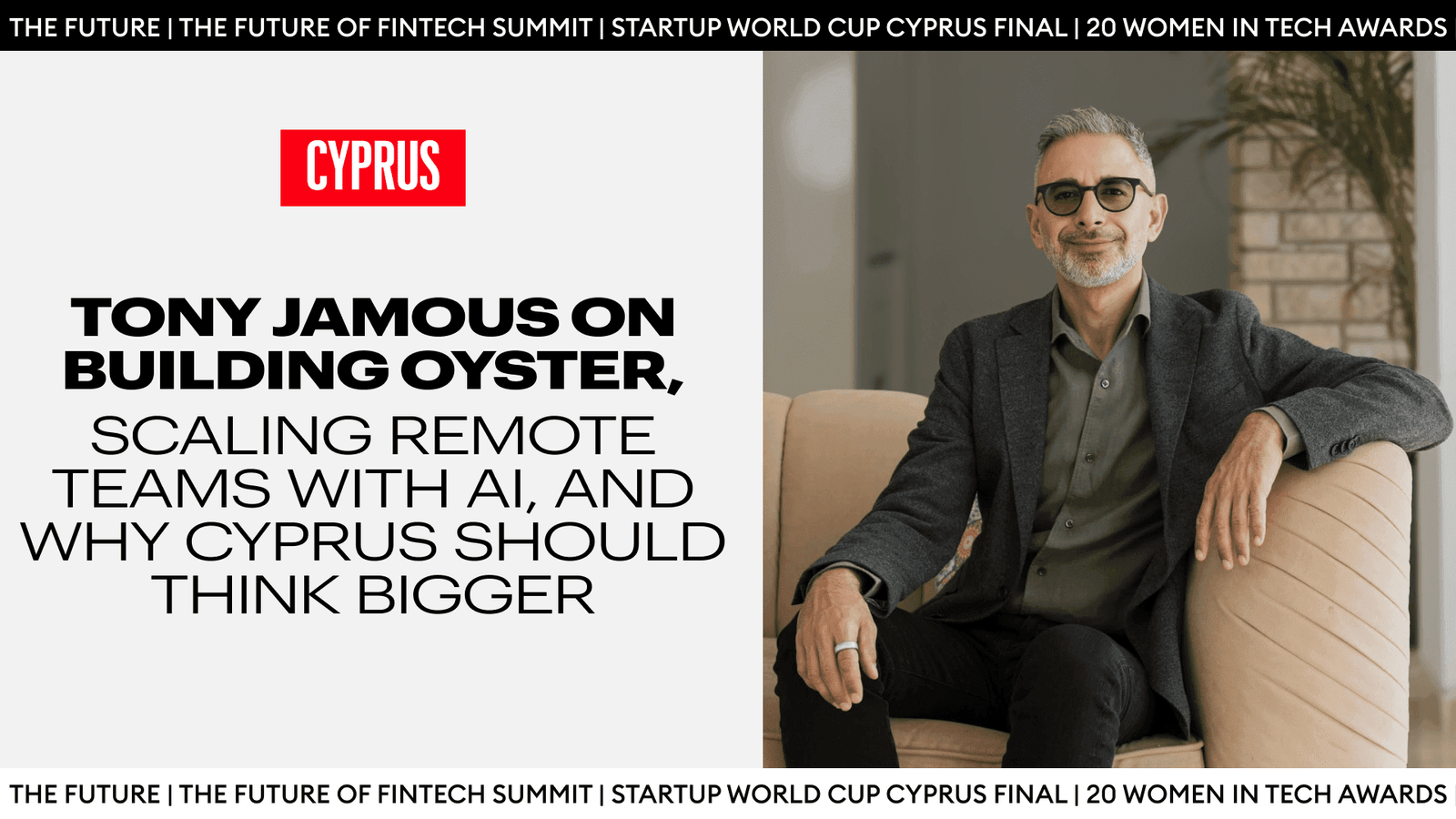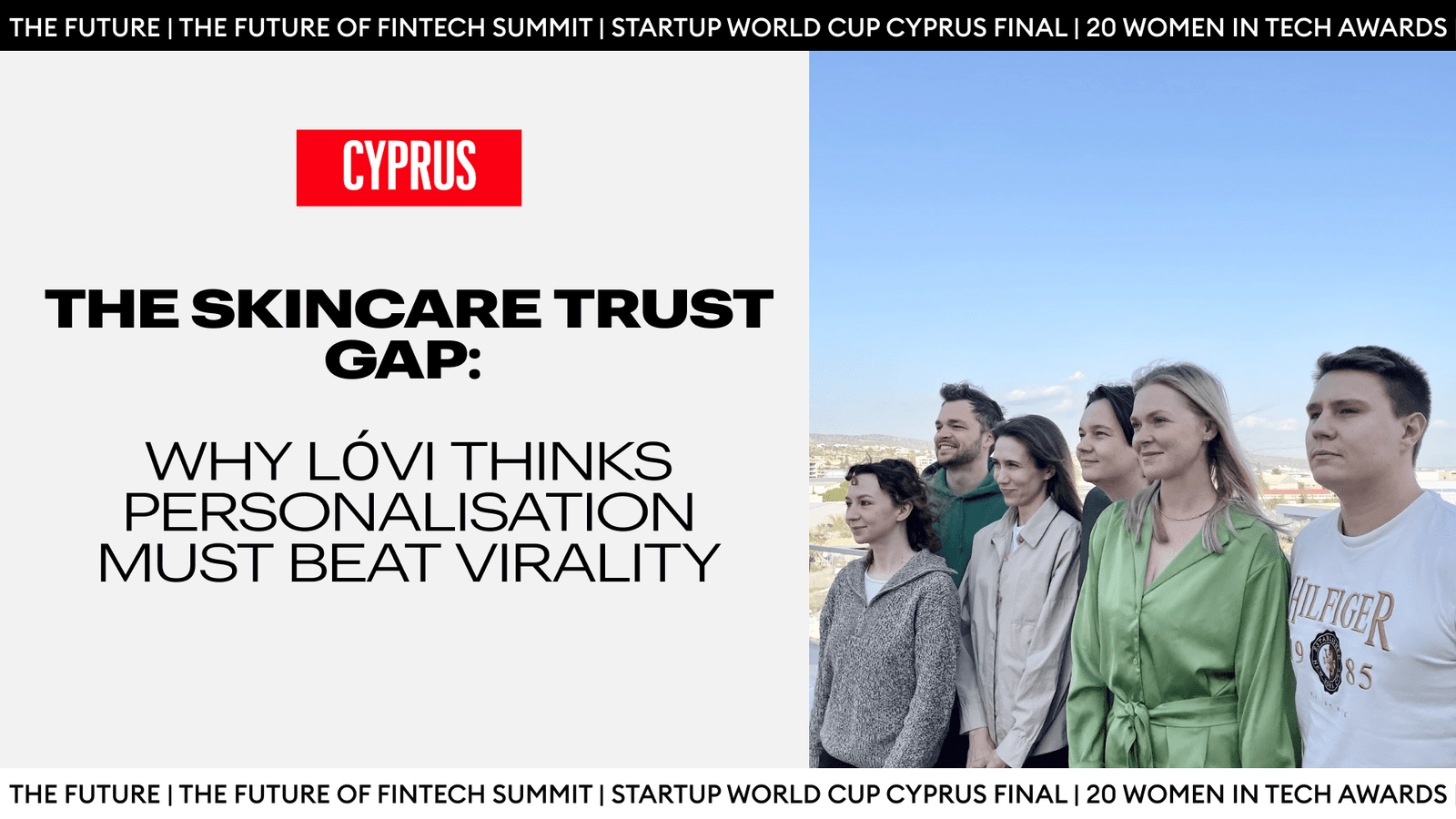Remote work may have opened new doors, but hiring across borders is still anything but simple. From compliance and payroll to cultural alignment and legal risk, companies face a complex maze when building global teams. That’s the gap Tony Jamous set out to close.
As CEO of Oyster, a fully remote HR platform operating in over 180 countries, Jamous is rethinking what employment infrastructure looks like, utilizing software and AI to make it as easy to hire in Lagos or Limassol as it is in London. His mission? To create a world where talent doesn’t have to migrate to succeed.
Follow THE FUTURE on LinkedIn, Facebook, Instagram, X and Telegram
In this exclusive interview with The Future Media, Tony Jamous shares how Oyster is using AI to streamline international hiring, why trust should be the heart of remote work culture, and how Cyprus could become a serious player in the remote economy.
Before we discuss Oyster, could you share a bit about your background and what led you to focus on remote working and global hiring?
Yes, it all started when I was born. Everything connects to that point. I was born in a country called Lebanon, which is like a 20-minute flight from here. And I had to leave in my teenage years for the West to seek a better economic future. I was an economic refugee.
So, I moved to France, studied computer science, and 15 years ago, I started my first unicorn tech company. That company was successful. It generated billions in value and was acquired by Ericsson. I took some time off to clarify what my purpose was here on this planet. I did a lot of inner work, and that led me to realize that whatever I’m going to do next, it’s going to be purpose-driven.
And at that time, in January 2020, I started Oyster. It was about reducing brain drain and wealth inequality, so people like me don’t have to leave their home countries to seek better economic futures. And now we are in the age of AI, online work, and knowledge work. There’s no reason why, say, a developer in Nigeria has to depend on the local employment market when they can work anywhere.
So, that’s what led me to start Oyster as a mission-driven company to reduce wealth inequality by democratizing access to global job opportunities.
When you founded Oyster, what experiences from your previous company showed you that global hiring was still such a difficult problem to solve?
My first company was not fully distributed, but it was a global employer. We employed people in 45 countries. And I was able to witness the power of that: access to markets, access to talent, changing people’s lives in many emerging economies.
I wanted to recreate that in whatever business I would launch, but I couldn’t find solutions. Around late 2019, I talked to lawyers, I talked to HR people, and everybody was saying the same thing: there’s no solution. It’s painful. It’s one of the most painful things to do in global business. You have to set up an entity, hire lawyers, hire accountants, find local payroll providers, find health insurance providers, and calculate fair pay. Can you give them equity?
We spent millions of dollars in my previous business building our own internal “Oyster.” And the employee experience was inconsistent. Every country was different. It became a strategic problem. We couldn’t grow anymore. We couldn’t secure talent.
So, I had the idea that we could use software to make global hiring as easy as local hiring. Especially now with AI and the software technology, you can remove this complexity, since the complexity is mostly man-made. It is the tax systems, labor laws, accounting, and banking, and there is no reason why this should be so complex.
My previous business did the same for telecom. We built a software platform that connects all the telecom networks in the world. It was highly regulated, very complex. Every country had its own way of doing things. We created one API, one abstraction layer, and that enabled millions of developers to build applications.
So, I took the same concept and applied it to global employment and significantly lowered the barriers for companies to hire across borders.
You’ve built a platform that helps companies hire and manage talent anywhere. What kind of growth has Oyster seen over the past few years, team size, countries covered, and clients onboarded?
We started the company in January 2020. That was not luck. That was like synchronicity. That was meant to happen.
And that was a launchpad for the business. We went from zero to a billion dollars in market cap in two and a half years.
We had revenue growth that was faster than Google’s and Slack’s in their first years. We grew to the peak. We were at 700 people.
Oyster, obviously, is a distributed company. We are in 70 countries, hyper diverse, gender equal, across the board.
We represent the planet, and we raised over 290 million dollars. We’re also the only B Corp-certified company in our category.
You’ve built Oyster as a fully remote company. What are some concrete things you have done to maintain a collaborative working culture across borders?
The first step was designing with intention and purpose.
We design the way we work to make people successful, no matter where they are. Our default mode is asynchronous communication and collaboration. But we enrich it with intentional connection, human-to-human connection.
We’re also very disciplined in defining what success looks like: at the company, team, and individual levels. So, when someone wakes up in Manila, they know exactly what’s expected of them, even if their manager is in California.
We’ve also built a culture based on absolute trust. That was partly out of necessity, to be honest, because when you don’t see people in the office, you have to default to learning to trust them.
That has created magic in the business. Because when people feel trusted and cared for, they’re more engaged, they’re more retained, and they’re more productive.
What does that translate into in practical terms? How do you build trust?
We default to radical transparency. Every time I need to share something, I share, and we have communication processes in place that enable us to do that effectively and at scale.
But one of the key pillars of building trust is internal. It’s about deleting the thoughts that someone might not be acting with the best intent. It’s a discipline. When you catch yourself wondering, OK, is this person really working today? Are they doing a good job? All these thoughts have to be deleted absolutely. Nobody wins by holding onto them.
It becomes like a meditation practice. You learn to be aware of your thoughts and consciously and intentionally focus on the positive. That starts with me, the leader of the organization, and then it propagates. The final pillar is non-reactivity. When bad news or setbacks happen, we stay calm and create a safe space where people can be themselves. That’s what unlocks human potential.
These are the core ingredients of our culture.
Cyprus was recently ranked as having the lowest remote work rate in Europe, just 22%. On the other hand, Cyprus has reopened its digital nomad visa, a move to attract remote professionals, specifically for nationals outside of the EU. Why do you think certain countries are slower to embrace remote work, and what can be done to change that?
This might be an unpopular thing to say about Cyprus, but I think it comes down to work culture and the demand for knowledge workers.
Take, for instance, countries like Spain that are leading the way in Europe. It’s one of our top countries at Oyster in terms of remote workers. They have a large, highly-skilled population of knowledge workers and a lower cost of living than London, Berlin, or Paris. So people there enjoy this amazing lifestyle and still earn more than local market rates.
There’s no reason Cyprus couldn’t be even more attractive than Spain for this kind of setup. But to get there, the work culture needs to be modernized. I’m glad to see the government introducing this incentive, like the digital nomad visa.
From your perspective, what’s the biggest misconception employers still have about remote work, especially when hiring across barriers?
The biggest misconception is that people are more productive in the office. The reality is that belief is coming from a fear-based response from leadership. They sense that if employees are physically present, they’re easier to control.
But employees can feel that. They can feel the lack of freedom and control, and it results in lower performance. If you feel mistrusted, then you’re going to perform less. You’re going to care less. Contribute less.
The problem is that many leaders haven’t learned to deal with their own fear. And letting go of the need for control. Letting go of that need is where you can unleash real talent and potential.
Oyster operates across dozens of countries, each with its own legal and compliance landscape. How do you manage that kind of complexity at scale without slowing the company down?
It’s all about software architecture. And, I have to say, AI is certainly disruptive in this. We’re using AI everywhere to enable us to create an architecture that is modular.
Let’s say one country updates its regulations, which happens daily across 200 countries. With our system, we don’t need to manually reopen the platform and rewrite the code. The software detects any changes and updates automatically.
That abstraction layer makes our business far less complex than it otherwise would be. It gives us a competitive advantage because we can move faster. We can innovate faster.
Our rivals use more legacy systems, and they are, therefore, much slower because every time something changes, they have to rethink their processes from scratch.
Let’s say you get a worker from a new country. How long does it take for the system to adapt to that country’s employment policies?
It’s a matter of hours. Definitely less than 24 hours.
Here’s how it works: let’s say the HR or hiring manager goes into our platform and is guided through the process of issuing a compliant employment contract. AI assists you in designing that contract based on local laws. And you can trust it is compliant because Oyster is the legal employer. We offer compliance as a service.
Then you move into the benefits module: how much holiday to give, for example. In France, the minimum is 20 days, but most companies offer 25. But if you want to be on the level of Google, it’s 30 days.
You have a sliding scale to design the benefit package. Once the details are set, you hit send, and the employee receives the employment contract.
They create their account, sign the employment contract, and are officially employed. From there, it becomes a monthly payroll question. Every month, you have to process payroll.
And finally, what’s next for Oyster?
AI everything. That’s the big roadmap ahead.
We’re also tracking well towards profitability. My goal is to accelerate that while continuing to grow. We launched a new product late last year, which is called Global Payroll, to help companies employ in their existing entities.
That’s something we’re excited about.














